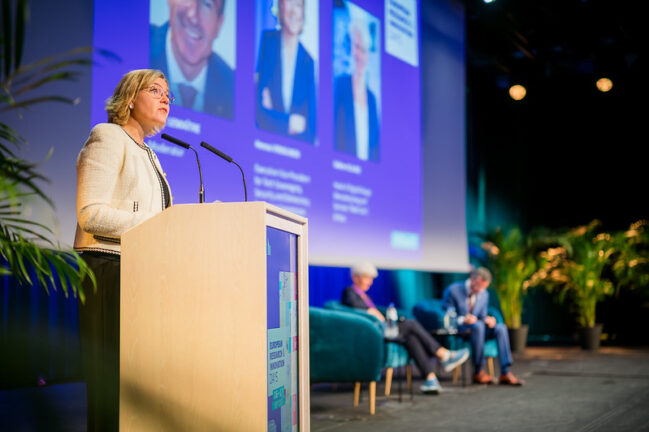European commissioner for tech, Henna Virkunnen, called for “rules in an innovation-friendly manner to support investments and innovations” as well as “simplifying things for AI developers”. She said so during a session about AI-powered research: a competitiveness opportunity for Europe, organised by the European Research and Innovation Days.
Marc Lemaître, research and innovation Director General at the European Commission, opened the debate by emphasising AI’s potential to reshape scientific inquiry. “AI is creating entirely new paradigms for scientific inquiry, automating hypothesis generation, enabling real-time analysis of massive data sets, and allowing researchers to explore previously impossible questions across disciplines,” he said. “For Europe, this represents both an opportunity to leap research competitiveness and a critical imperative.”
Dual strategy to drive AI in research
The European Commission is preparing to launch two flagship strategies by late 2025. The Apply AI Strategy, aimed at accelerating industrial adoption, and the European AI in Science, focused on research institutions. Central to the AI in Science initiative is RAISE (Resource for AI Science in Europe), which seeks to “bring together strategic resources, data, compute and AI talent to ensure that Europe believes in applying AI to science, as well as in shaping the foundations of AI”, Henna Virkkunen, Executive Vice-President for Tech, explained.
With funding from Horizon Europe and the Digital Europe Program reaching nearly €700m until the next multiannual financial framework, we are committed to advancing AI technologies. — Henna Virkkunen, Executive Vice-President for Tech
Funding is a pillar of these initiatives. Tech research gets to spend nearly €700m from Horizon Europe and the Digital Europe Program until the next MFF. Complementing it, an AI Skills Academy is being established to expand Europe’s talent pool and accelerate AI adoption in research and industry. “With funding from Horizon Europe and the Digital Europe Program reaching nearly €700m until the next multiannual financial framework, we are committed to advancing AI technologies,” Ms Virkkunen said.
Calls for clear regulation
Regulatory complexity was a recurring theme during the session. Both Industry representatives and the Commission agreed that regulatory clarity is essential. “We want to implement our AI Act and other rules in a very innovation-friendly manner to support investments and innovations in this area and for simplifying things for AI developers,” said the commissioner.
Industry representatives agreed and added that regulatory clarity is critical to closing Europe’s innovation gap with global competitors. Sabine Klauke, Head of Digital Design Manufacturing and Services at Airbus, warned “we need a real dynamic simplification of regulation”.
“We need a real dynamic simplification of regulation” — Sabine Klauke, Airbus
Ms Klauke shared some examples of AI-driven systems in the aerospace sector. It includes applications in autonomous taxiing, pilot assistance, predictive maintenance platforms, analysis of operational aircraft data, and computer vision for space missions like the Jupiter Icy Moons Explorer. Yet she argued that regulation hinders risks. “The AI Act is a good first step. Now we need it simplified, clarified, to support the innovation in the EU strategic sectors as a focus and projects to maximise impact and increase investment” Ms Klauke added.
Innovation-friendly rulebook
The debate took place amid broader regulatory reforms. Earlier in the day, the European Commission launched a public consultation on simplifying legislation in the fields of data, cybersecurity, and AI. According to Virkunned, the consultation is part of creating an “innovation-friendly rulebook”. The initiative will run until 14 October, in support of the upcoming digital omnibus.
The consultation comes on the first anniversary of the Draghi report, which highlighted slow progress in implementing EU competitiveness recommendations. Former ECB head Mario Draghi called for simplification of the GDPR, noting that legal complexity raised industry costs by 20 per cent. He also suggested a pause on the next stage of the AI Act until potential drawbacks are fully understood. The next phase will take effect on 2 August 2026, covering high-risk systems.











